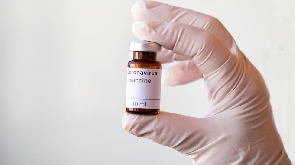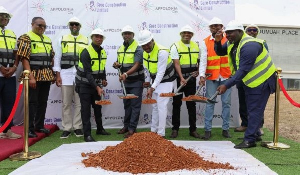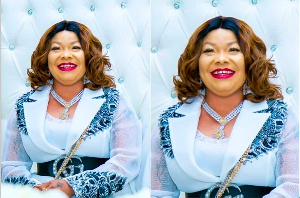The National Commission for Civic Education (NCCE) has taken COVID-19 Vaccination Public education to some principal streets to ensure that the mysteries surrounding the vaccine is demystified.
The NCCE Ablekuma Central Municipal Directorate has repackaged the COVID-19 Vaccination sensitization messages in local languages as it engages the people on the need to take the vaccine.
Mrs Comfort Azalletey NCCE Ablekuma Central Municipal Director explained during a street engagement at Abossey, and Banor in Accra that the commission has packaged accurate, evidence-based information about COVID-19 vaccines to provide people with essential facts about the vaccines that will help end rumours.
“We all need information that can be trusted. Misinformation and false claims threaten to undermine the success of vaccines and put people's lives at risk. Help us to increase the amount of fact-based, accurate content,” Mrs Azalletey stated.
The NCCE Municipal Director also noted that Commission is also taking the sensitization programmes to churches, mosques, schools and markets to enlighten citizens on why they have to get vaccinated and continue practising the safety protocols.
Mrs Azalletey told the Ghana News Agency later in an interview that despite the record speed at which they have been developed, COVID-19 vaccines have still been subject to the same checks, balances, and scientific and regulatory rigour as any other vaccine, and shown to be safe.
She said currently available coronavirus vaccines have been tested on adults of various ages, as well as those with long-term conditions, and is safe; “But there are a few groups who should avoid being vaccinated for now”.
The NCCE Municipal Director noted that vaccines are one of the most effective public health interventions, but some individuals cannot receive them.
“Fortunately, none of the COVID-19 vaccines which have been approved for emergency use around the world contains a live virus, so it is safe for people with weak immune systems to receive them, unlike some others, including yellow fever and measles-mumps-rubella (MMR) vaccines.
“This means more of the world’s population can be protected against the SARS-CoV-2 virus that causes COVID-19. Even so, there are still a few groups who should either avoid being vaccinated for now or carefully weigh up the risks and benefits with a health provider,” she noted.
Mrs Azalletey explained that people with a history of specific allergies, must consult health practitioners before taking the vaccine; Children under 16 years are also currently included in the vaccine.
She also advised pregnant women to consult their doctors as pregnant women were excluded from clinical trials of the vaccines, there is not enough data to say whether or not they are safe.
However, because pregnant women appear to be at higher risk of severe COVID-19 than non-pregnant women, and there is an associated slightly increased risk of premature birth, there is an argument for some to receive the vaccines.
Having reviewed all the available evidence for the Pfizer and Moderna vaccines, the American College of Obstetricians and Gynaecologists said these vaccines should not be withheld from pregnant women in high-risk groups which have been prioritised for vaccination and should be offered to breastfeeding women in these groups, she revealed.
Similarly, although the WHO doesn’t recommend vaccinating pregnant women with the Pfizer and Moderna vaccines at this time, it said in light of the benefits outweighing any potential risks, vaccination may be considered in discussion with their healthcare provider.
Health News of Tuesday, 30 March 2021
Source: GNA













